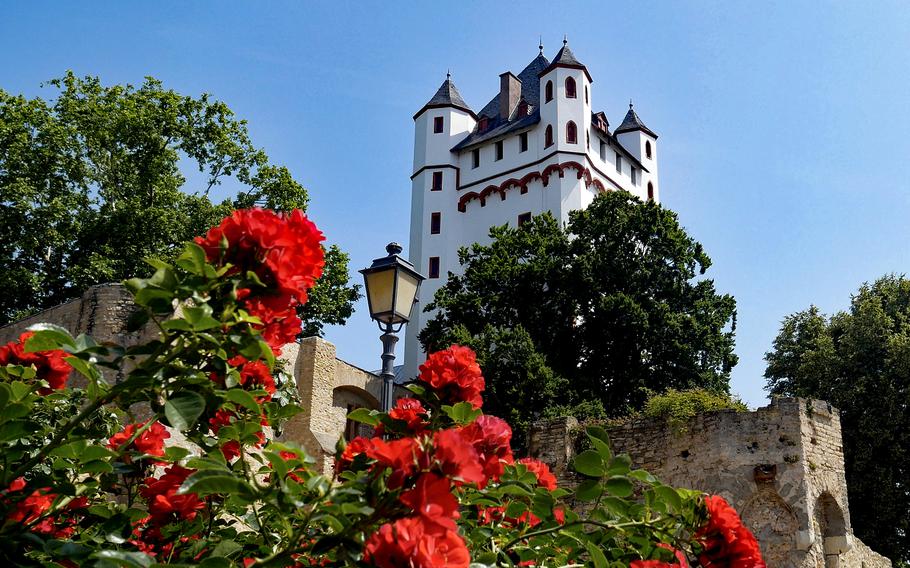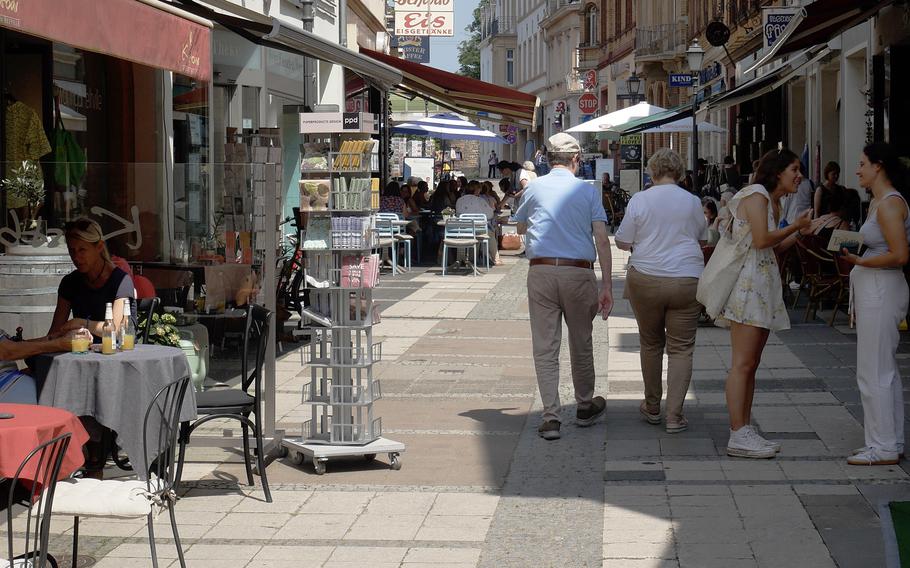
The castle in Eltville am Rhein, Germany, was built in the 14th century and partially destroyed by Sweden in the Thirty Years War. Today, it houses a museum in its tower and is surrounded by gardens. The Rhine River town is famous for its roses and wine. (Michael Abrams/Stars and Stripes)
Eltville am Rhein invites visitors to slow down, have a glass or two of wine and stroll through centuries of history along the banks of the Rhine River.
Germany’s oldest town in the Rheingau region, Eltville is known not just for its sparkling wines but for its devotion to roses, which bloom through summer and into fall.
Eltville gained its city rights way back in 1332, and its castle overlooking the Rhine dates to the same time.
The best place to start exploring Eltville, which is just down the road from Wiesbaden, is the 14th-century Elector’s Castle. It houses the tourist information office and a small museum.
But to get there you will likely pass another town attraction: a collection of half-timbered houses, some many centuries old.
Pick up a walking tour map of the town at the tourist office, then start climbing the 118 steps of the castle tower. There are four floors to check out, the second of which is called the Count’s Hall and was once the living and working quarters.
Up a floor is an exhibition dedicated to Johannes Gensfleisch, better-known as Gutenberg. The inventor of the printing press was born and died on the other side of the Rhine in Mainz but had family in Eltville. And some of the earliest versions of his press were used here.
Keep climbing the stairs and you come to a room used for temporary exhibitions, the current one made up of works by local artists. From the top floor of the 78-foot-tall tower you get a view of the town, the vineyards and the Rhine.
On the descent, don’t stop at the ground floor. Keep going down the spiral staircase until you reach the former dungeon, with its 8-foot-thick walls.
Back outside, it’s time to stop and smell the flowers. Two wonderful gardens have been planted in what was once the castle moat. Most of its thousands of blooms are roses.
Although the peak is in June, many varieties bloom for a few months afterward.
Roses were big business in Eltville in the 19th century until the local industry faded after World War I. The planting of the castle roses began in 1979 and flower lovers have gotten to enjoy the thrill ever since.
Across the battlements is the nicely laid-out Amtsgarten, or official garden. It gets its name from when a local court was in the castle. Today it has more roses and a shady linden tree grove.
After leaving the castle, grab something to eat or drink at the marketplace. It features a fountain with water flowing from wine barrels loaded on a ship, a nod to the wine once transported downriver.
Afterward, stroll upriver along the Rhine promenade. Eventually you will come to Burg Crass, a castle built in the 11th and 12th centuries. Today it is the oldest building in Eltville, but then it was outside the town’s medieval walls.
Back in town you will see the enormous Stadtturm, part of an old town gate. In the 18th century, it was the city prison.
Check out the shops on Erbacher Strasse and pedestrian Schwalbacherstrasse before heading back toward the river, past wineries and the Saints Peter and Paul Church. Construction on the Catholic house of worship began in the mid-14th century.
Also, be sure to visit the wine tasting stand on the bank of the Rhine. Here, visitors can sample vintages produced in the town’s wineries from the grapes of the famed Rheingau.
To get a fuller introduction to Eltville through sparkling wine, which Germans call sekt, go during the first weekend in July for the Sekt and Biedermeier Festival.

People enjoy a sunny day on Schwalbacherstrasse, a pedestrian shopping street in Eltville am Rhein, Germany. (Michael Abrams/Stars and Stripes)
On the QT
Where: Eltville is about 12 miles west of Wiesbaden’s Clay Kaserne, and about 65 miles from Vogelweh in Kaiserslautern.
Hours: Tourist info office and Eltville Castle, 10:30 a.m.-5 p.m. daily from April to October, and 11 a.m.-3:30 p.m. daily from November to March. Castle gardens, 9:30 a.m.-7 p.m. daily from April through mid-October, and 10 a.m.-5 p.m. daily the rest of the year.
Costs: Parking costs around 1.50 euros per hour at parking garages. Entrance to the castle tower is 3.50 euros for adults, 2.50 euros for people ages 12 to 18, and free for children 11 and under.
Information: Online: eltville.de